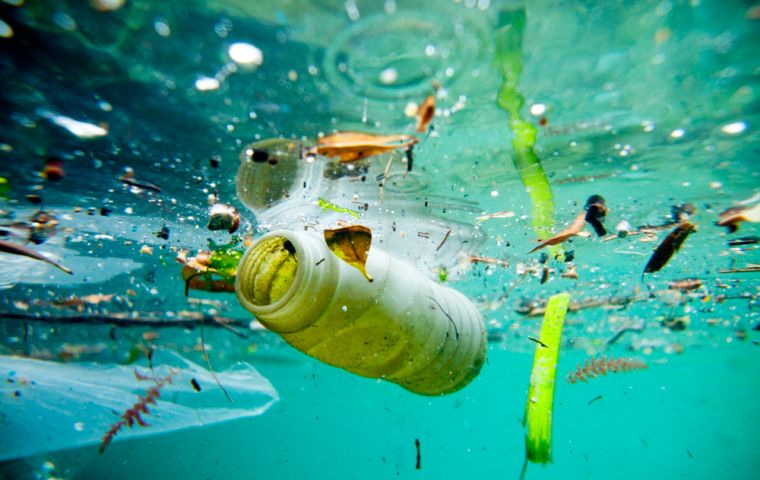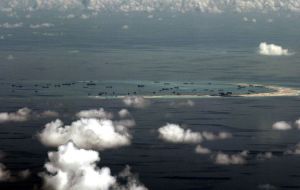MercoPress. South Atlantic News Agency
Oceans' plastic pollution is illegal but, how to implement international treaties and conventions?
 Numerous international and regional treaties, conventions impose binding obligations on countries to protect the oceans, their wildlife and their ecosystems
Numerous international and regional treaties, conventions impose binding obligations on countries to protect the oceans, their wildlife and their ecosystems  But there is one great problem with international law: The commitments may be solemn and legally binding, but they are hard to uphold.
But there is one great problem with international law: The commitments may be solemn and legally binding, but they are hard to uphold. The pollution of oceans with plastic litter, discarded nylon fishing nets and eco-toxic micro-beads is well known as one of the great scourges of the modern age ― not just entangling and choking endangered, charismatic species like sea turtles, dolphins and even great whales, but attracting long-lived organic pollutants that end up permeating the entire marine food chain, right up to the fish on our plates.
Less well known is that all this ocean plastic is illegal.
Numerous international and regional treaties, conventions and other agreements impose binding obligations on countries to protect the oceans, their wildlife and their ecosystems from pollution. That includes pollution originating on land, like plastic bottles, shopping bags, crisp packets, cigarette lighters and cellophane wrappers.
But there is one great problem with international law: The commitments may be solemn and legally binding, but they are hard to uphold. There is no police force or prosecutor tasked with their enforcement. Only state parties to a treaty have the power to raise disputes against other parties, and they are generally reluctant to do so, for understandable reasons. They do not wish to disrupt harmonious diplomatic relations with their neighbors; they may fear the potential costs; and few governments are so perfect themselves as to have no worry of being at the receiving end of similar treatment.
As a result, states that disregard their legal obligations to protect the marine environment from ocean plastic and other assaults are not quaking in their boots. Even though they could in principle be hauled up before the International Tribunal of the Law of the Sea, which has the power to apply substantial penalties, costs and reparations against offending parties, they see no immediate prospect that his might actually happen. And they are almost certainly right.
That does not mean there is nothing to be done. On the contrary, naming and shaming is a powerful weapon for change. No government likes to be denounced for breaches of international law and other binding promises. Ocean plastic campaigners around the world can use the moral force of international law to pressure governments to fulfill environmental commitments, enter into compliance, and take serious action to drastically reduce plastic pollution to oceans.
The countries most responsible for marine plastic pollution should be at least a little worried. All it would take to establish that international law really does have teeth is a single small state whose beaches, tourism or fisheries are suffering from a tide of waste plastic to take legal action against countries where it is coming from. And while such a state may be fearful of acting on its own, if backed by a wider coalition like the Association Of Small Island States and supported by a union of conservation NGOs and civil society, that could very well change as the volume and impact of marine plastics increase.
And change is what we desperately need ― to stop the flow of plastic into our seas, currently estimated at some 8.8 million tons a year; to save all the wondrous creatures and precious ecosystems the plastic tide is propelling into extinction; and to restore the wider health of our oceans, and the totality of life on Earth.




Top Comments
Disclaimer & comment rules-

Read all commentsQ: How to implement international treaties and conventions?
Feb 27th, 2018 - 09:37 am 0A: By dumping MORE waste into the oceans.
Commenting for this story is now closed.
If you have a Facebook account, become a fan and comment on our Facebook Page!